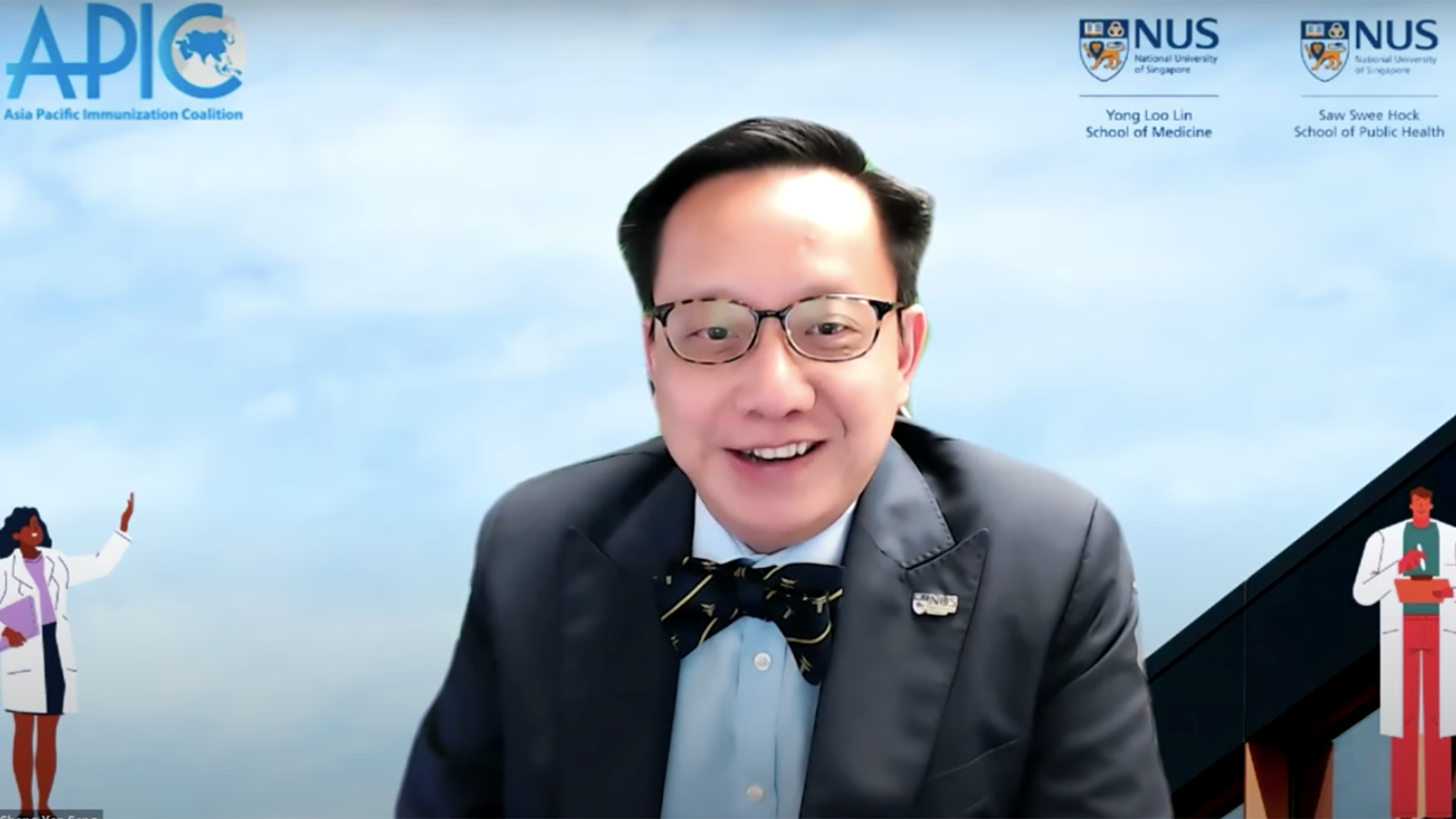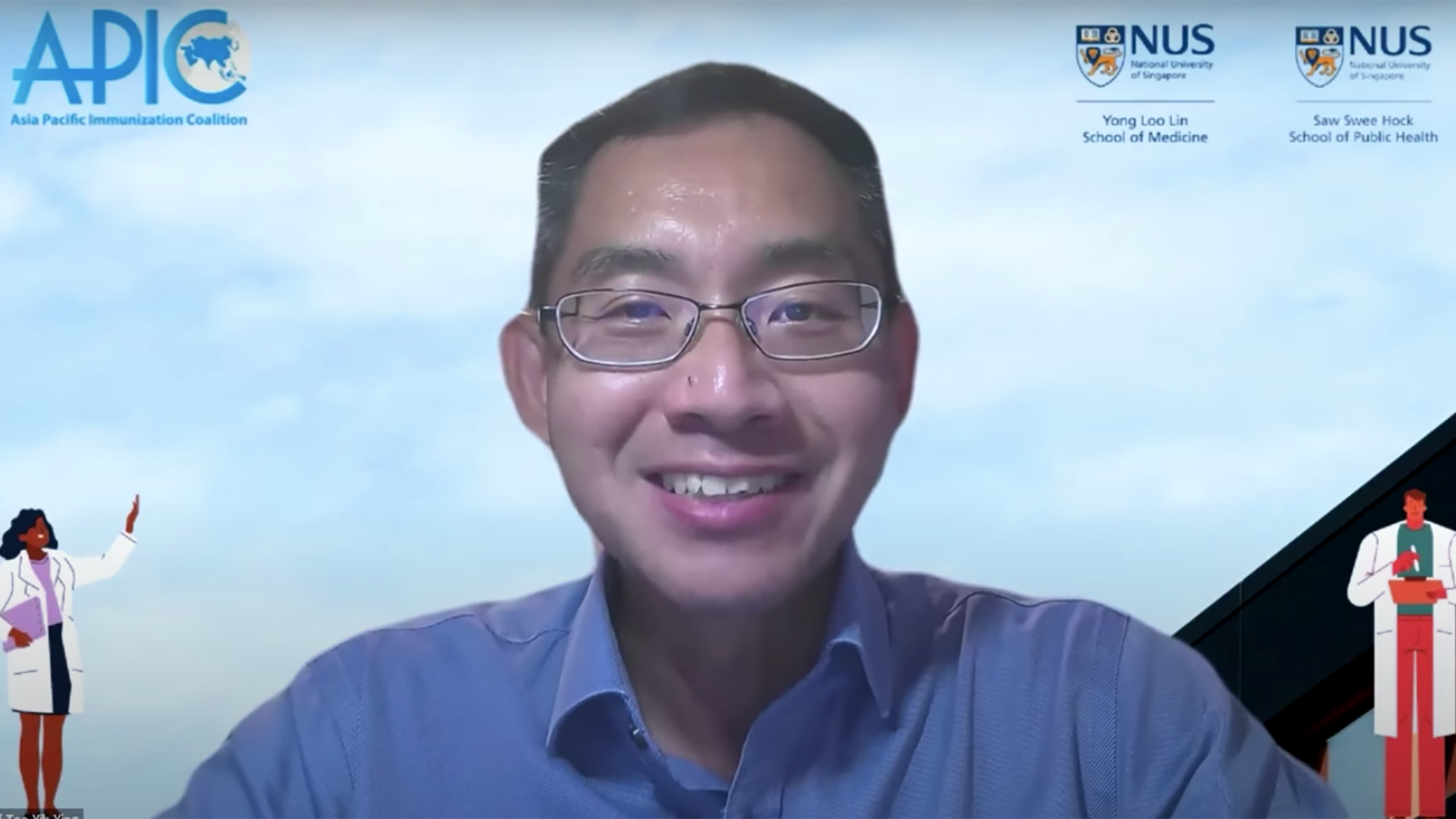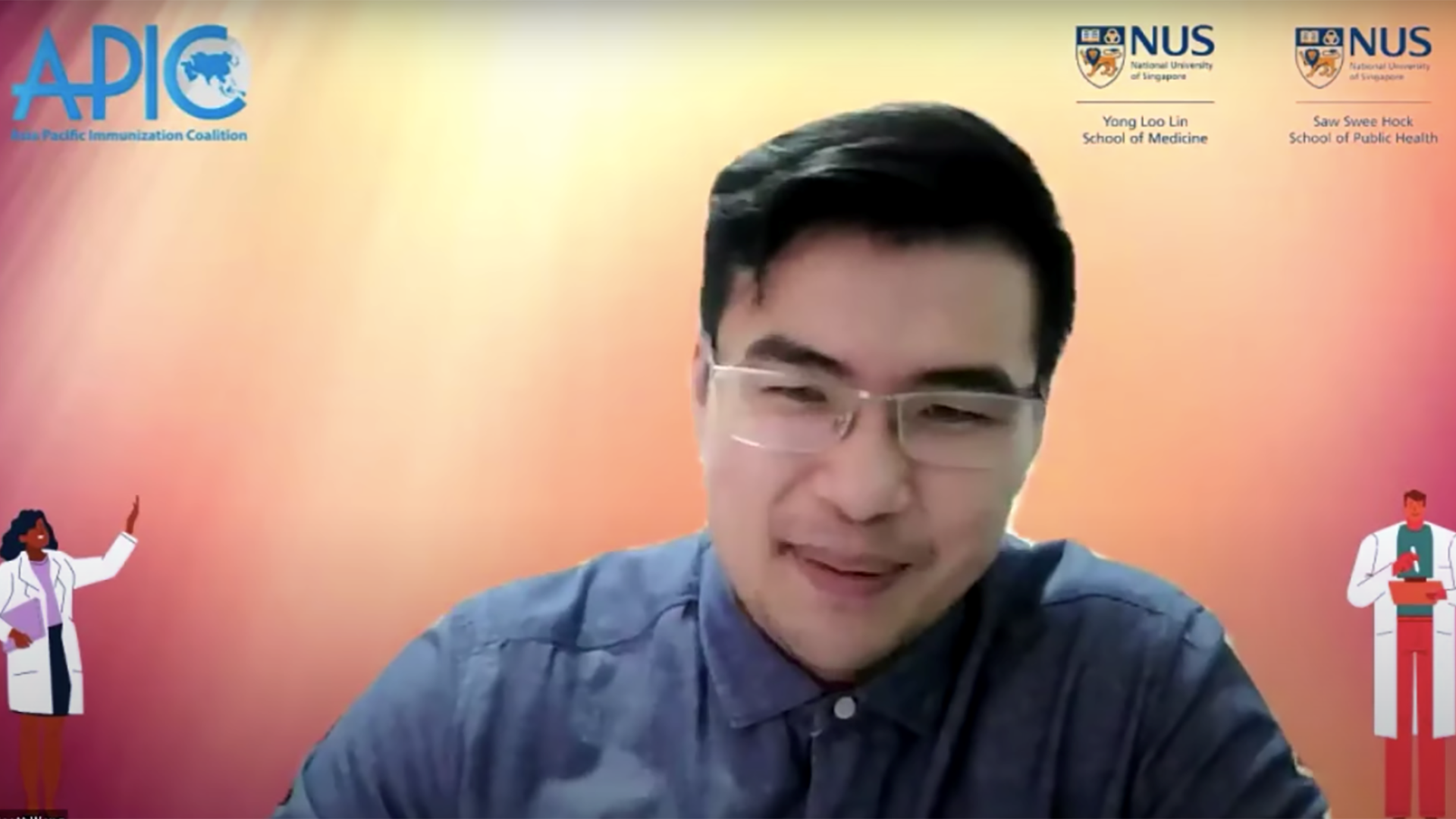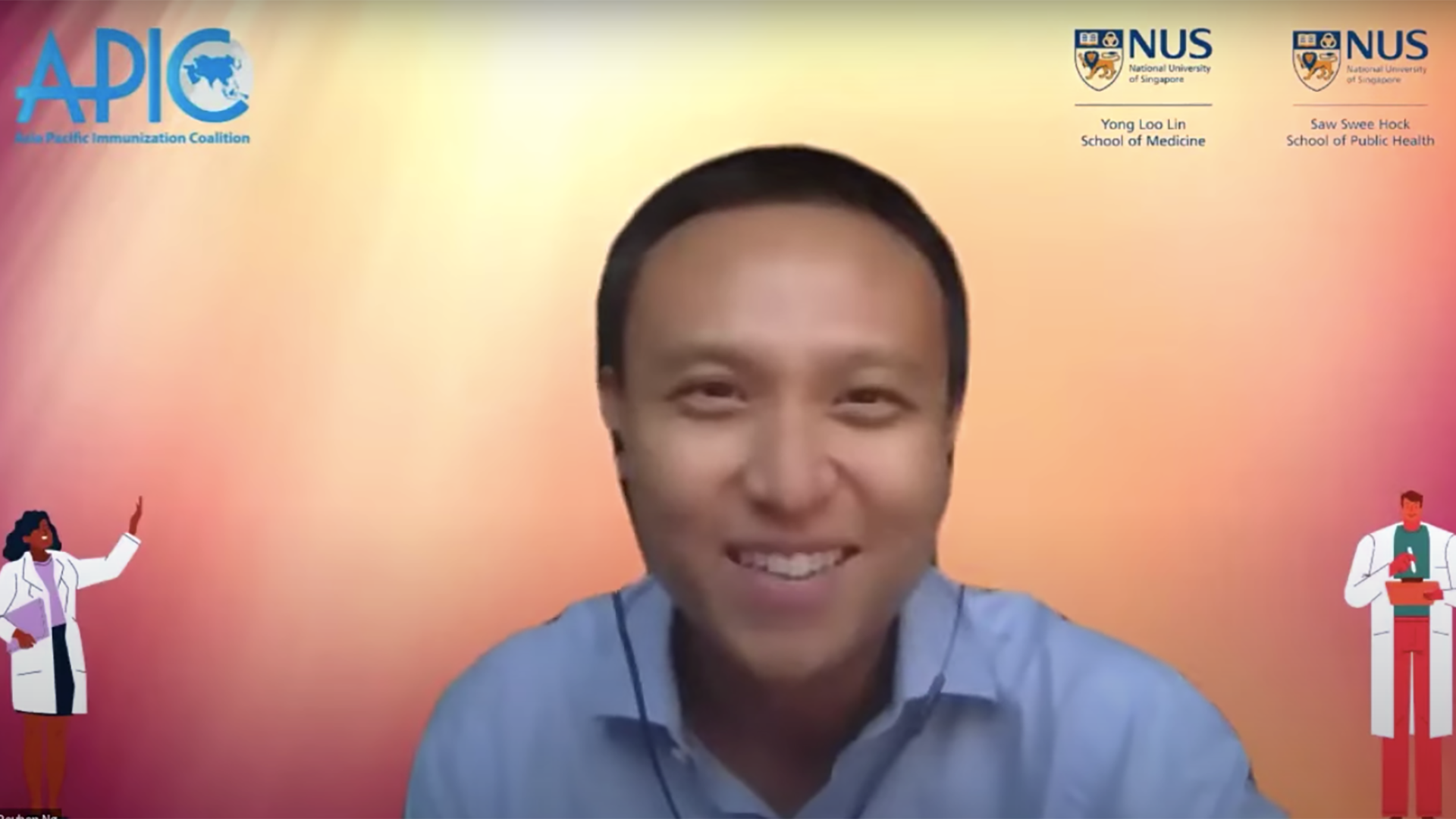Finding the cure for vaccine hesitancy
10 June 2021 | Thursday | News
Image Source : NUS
As COVID-19 swept across the world last year, the race to develop a vaccine went into overdrive. The speed was unprecedented. Something that typically takes 10 to 15 years to produce became reality in just a matter of months.
Since then, more than 1 billion doses of various COVID-19 vaccines have been administered worldwide, serving as an important line of defence against the virus. But the speed at which the vaccines were rolled out have led to doubts, said NUS President Professor Tan Eng Chye.
“Understandably, there are some questions and concerns among the public on safety and efficacy standards,” he said, adding that the rise of misinformation on social media platforms has further fuelled vaccine hesitancy – a delay in acceptance or refusal of vaccines despite their availability.

This has been one of the biggest challenges in controlling the pandemic, noted Prof Tan in his opening address at the International Conference on Vaccine Confidence and Acceptance, a virtual conference organised by the Asia Pacific Immunization Coalition (APIC) on 28 May. It was jointly hosted by the NUS Yong Loo Lin School of Medicine and NUS Saw Swee Hock School of Public Health (SSHSPH).
Such spread of misinformation is dangerous, added Professor Chong Yap Seng, Dean of NUS Medicine. “We need to ensure that all people, both young and old, understand the value of vaccines, and their crucial role in creating healthier societies. There needs to be an understanding that no one is safe unless everyone is safe,” he stressed.

To fight vaccine hesitancy, more also needs to be done in terms of communication, said SSHSPH Dean, Professor Teo Yik Ying. “Fake news, misinformation and disinformation have worsened in light of COVID-19,” he said. “Most importantly, how do you communicate the benefits and anticipated side effects to people in a transparent, yet informative way?”

The forum went on to discuss the solutions to eliminate vaccine hesitancy, such as harnessing technology and formulating proper communication strategies.
Efficient and Effective
Despite concerns surrounding the speed of vaccine roll-out, there is no denying their effectiveness.
NUS Medicine’s Professor Paul Tambyah, an infectious diseases expert who is also Senior Consultant at the National University Hospital, referred to the recent resurgence of COVID-19 cases in Singapore and cited the Tan Tock Seng cluster as an example.

With only three out of 30 vaccinated healthcare workers from Ward 9D getting infected, the vaccine had maintained an efficacy rate of 90 per cent. In contrast, the SARS outbreak 17 years ago saw 10 healthcare workers infected in a similar-sized ward. This points to a far higher attack rate when no vaccine is available, he observed during a plenary about vaccine adverse-event monitoring.
“To my knowledge, there has (also) never been a transmission of COVID-19 from a vaccinated individual”, added Prof Tambyah.
While there has been reported side effects in vaccines such as rare blood clots and allergic reactions, he maintained that the benefits of mass vaccination outweigh the risks.
“Even if the incidence is 10 per million, that’s 999,990 people who are going to take the vaccine without getting blood clots. You’ve got to weigh up the numbers,” he said.
The 3Cs of vaccine strategy
To assuage concerns about the side effects of vaccines, clear communication is crucial, said NUS Senior Vice President (Health Education & Resources) Associate Professor Benjamin Ong, who is also Chairman of Singapore’s COVID-19 Vaccination Strategy Committee.

With more than one-third of the Singaporean population having received at least one dose of a COVID-19 vaccine, and about one-quarter fully vaccinated, Singapore has been relatively successful in getting its population vaccinated.
Speaking on a panel about public acceptance of COVID-19 vaccinations in Singapore, he shared the city-state’s 3Cs strategy of targeting confidence, convenience and complacency.
Building confidence requires the rigorous testing of the vaccines. “The Health Sciences Authority (HSA) studied the various stages of vaccine trials, quality of trials, and their outcomes,” noted Assoc Prof Ong, adding that this approach offered assurance to the population.
Being transparent also helps to build trust. “(It) gives members of the public, and healthcare professionals the confidence to push ahead. I feel that trusted information is really important to bring the public on board”, he said.
Another crucial factor in promoting vaccinations is making information easily accessible so that people who are undecided are more likely to give it a shot due to the convenience.
Dr Scott Wong, a Medical Officer and Senior Data Scientist at the Ministry of Health, demonstrated how information technology can be deployed to spread awareness about vaccines. He gave the example of chatbots that provided audio and visual information about the virus to Singapore’s migrant workers who had been severely impacted by COVID-19 last year.

A powerful vaccination strategy must also eliminate vaccine complacency. For instance, in countries that have controlled the spread of COVID-19, there are more instances of people opposing vaccines as they may not realise the severity of the pandemic, noted Assoc Prof Ong.
To counter this, Singapore will need to find ways to motivate people into taking the vaccine –
for example, by using incentives such as waivers for COVID-19 tests, or leveraging on a ‘fear of missing out’. “As you can see, over time, the more people get vaccinated, the share of people willing to get vaccinated, has also grown”, he added.
Framing the narrative
Effective communication is not just about choosing the right mode of transmission, but also about crafting compelling content.
Speaking on a panel about global vaccine acceptance, Director of the Vaccine Confidence Project (VCP) Professor Heidi Larson said finding the most engaging way to portray vaccines is critical in shaping how people perceive them.

Based in London, the VCP monitors public confidence in vaccines. Prof Larson explained how certain words like ’moral obligation' can illicit negative responses because they frame vaccines as something forced upon people. Instead, she called for vaccines to be associated with ‘protection’ as it resonates with what people care about.
Ms Karen Alparce-Villanueva, Vice-President of the Philippine Alliance of Patient Organisation (PAPO), who spoke at a plenary that discussed ways to increase public engagement, shared about shifting the narrative from being authoritative to more emotive so as to better connect with citizens.
The “I’m the medical expert, therefore you listen to me” approach is no longer ideal, she said.

Whole of government approach
As with crafting narratives, proposed solutions need to be well-rounded and inclusive. This calls for a whole of government approach, said NUS President Prof Tan and Assistant Professor Reuben Ng, Lead Scientist (Data and Technology) at the NUS Institute for the Public Understanding of Risk.

“Overcoming vaccine hesitancy will require a coordinated interdisciplinary strategy involving not only the health and medical professionals, but equally social scientists, communication specialists, the media and the community”, said Prof Tan.
Asst Prof Ng also called for different ministries to play more prominent roles. Taking a differentiated approach helps determine how best to frame messages, and opens up more channels of communication, he added.
“I think (a whole of government) approach will really push things ahead”.
The way forward
This conference is timely in the fight against COVID-19, as it provided “ample opportunity for learning about the [global vaccination situation]”, said Prof Tikki Pangestu, Co-Chair of APIC and Visiting Professor at NUS Medicine.

The takeaways from the various local and international speakers will shape vaccination strategies in numerous ways, he noted.
Wrapping up the conference, Prof Chong from NUS Medicine reiterated the need to learn lessons from the pandemic that will offer sustainable solutions for the future.
“This pandemic is a defining moment, and we should use it as a lesson to think about how we should proceed with vaccines. It is important that we don't just go back to business as usual after all this,” he said.
Most Read
- Management of Relapsed/Refractory Multiple Myeloma
- 2025 Drug Approvals, Decoded: What Every Biopharma Leader Needs to Know
- BioPharma Manufacturing Resilience: Lessons From Capacity Expansion and Supply Chain Resets from 2025
- APAC Biopharma Review 2025: Innovation, Investment, and Influence on the Global Stage
- Top 25 Biotech Innovations Redefining Health And Planet In 2025
- How Health Systems Are Reshaping Drug Adoption, Partner Models, and Market Access in 2026
- The New AI Gold Rush: Western Pharma’s Billion-Dollar Bet on Chinese Biotech
- Single-Use Systems Are Rewiring Biopharma Manufacturing
- The State of Biotech and Life Science Jobs in Asia Pacific – 2025
- Asia-Pacific Leads the Charge: Latest Global BioSupplier Technologies of 2025
- Invisible Threats, Visible Risks: How the Nitrosamine Crisis Reshaped Asia’s Pharmaceutical Quality Landscape
Bio Jobs
- The State of Biotech and Life Science Jobs in Asia Pacific – 2025
- Avantor’s New CEO Ligner Aims to Unlock Global Potential and Deliver Shareholder Value
- AstraZeneca Commits $50 Billion to U.S. Expansion by 2030 in Biggest-Ever Global Investment
- Thermo Fisher, SAMRC, and South Africa’s Department of Science and Innovation Launch CATIR to Nurture Next-Gen Scientists
- Cube Biotech Appoints Former Sartorius CEO Dr. Joachim Kreuzburg to Board of Directors
- FDA’s AI Transition Marks a Turning Point in Drug Review: Industry Faces Pressure to Adapt Amid 20% Workforce Cut
- WuXi XDC Completes Mechanical Build of Singapore Bioconjugate Manufacturing Hub
News
Editor Picks











